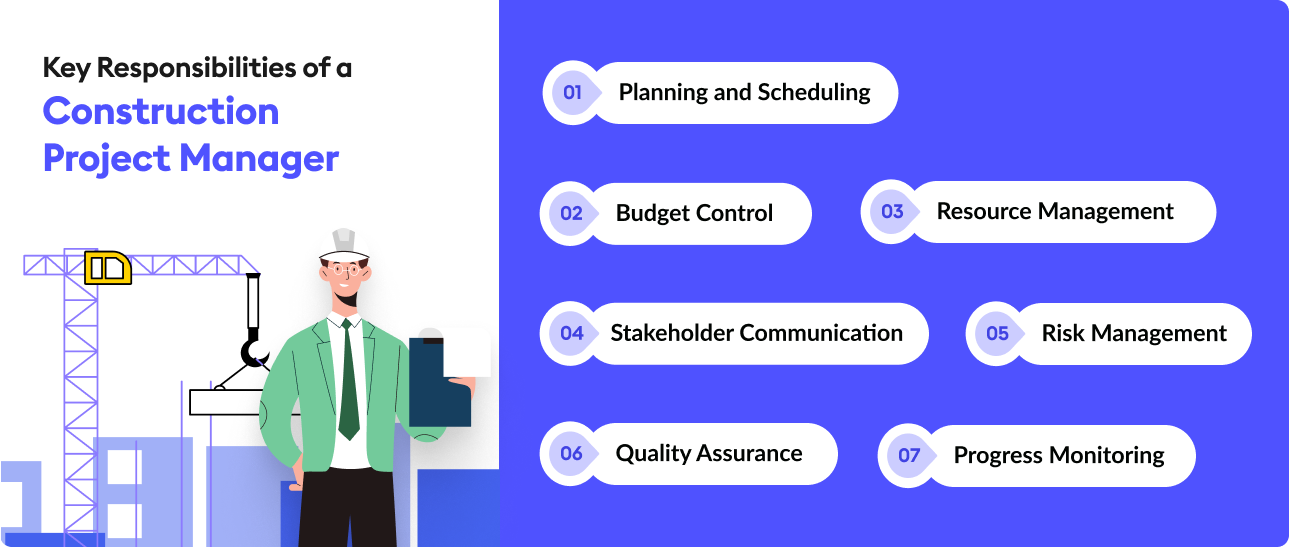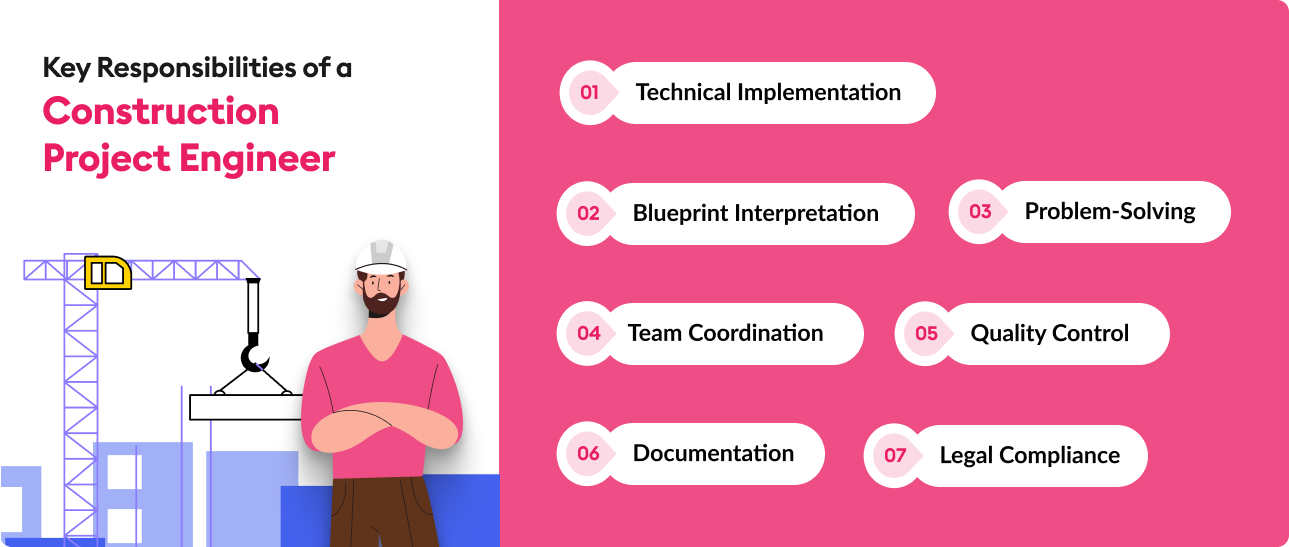Every construction project is a balancing act — project deadlines, budgets, architectural designs, and then comes on-site project execution. At the heart of this balance are two critical roles: the Project Manager and the Project Engineer. While their responsibilities often overlap, their focus areas couldn’t be more different.
What is a Project Manager in Construction?
A Project Manager (PM) in construction is responsible for overseeing the project from conception to completion. They are the leaders who ensure that a project meets client expectations while staying within scope, budget, and timeline constraints. Project managers handle construction site management, coordinate with stakeholders, and ensure compliance with safety and quality standards.
The PM is responsible for the big picture — ensuring projects are delivered successfully while balancing strategic and operational demands.
Key Responsibilities of a Construction Project Manager

Project management responsibilities include:
- Planning and Scheduling: Defining the project scope, timelines, and milestones.
- Budget Control: Monitoring costs, preparing estimates, and ensuring financial efficiency.
- Resource Management: Allocating manpower, materials, and equipment.
- Stakeholder Communication: Acting as the primary point of contact for clients, contractors, and the project team.
- Risk Management: Identifying potential risks and creating mitigation strategies.
- Quality Assurance: Ensuring work meets contractual and quality standards.
- Progress Monitoring: Tracking timelines and adjusting plans when necessary.
These responsibilities require not just technical knowledge but also strong project leadership skills to coordinate across teams and keep projects on track.
Essential Skills for a Project Manager
Successful PMs possess a blend of technical expertise and leadership abilities:
- Leadership and Communication Skills: To guide teams and maintain stakeholder relationships.
- Time and Resource Management: To ensure deadlines are met without overextending resources.
- Financial Planning: For budget planning, cost control, and resource allocation.
- Risk Assessment: To foresee problems and act proactively.
- Problem-Solving: To handle unexpected issues efficiently.
- Technical Knowledge: While not as in-depth as a project engineer, a PM should understand engineering basics to make informed decisions.
These skills make project managers critical in construction site management and overall project success.
What is a Project Engineer in Construction?
A Project Engineer (PE) in construction is responsible for the technical execution of a project. They transform designs and plans into tangible structures by ensuring that engineering specifications are followed accurately. Project engineers handle engineering project roles that involve technical analysis, coordination, and troubleshooting on-site.
PEs act as the link between the design team and the construction team, ensuring technical accuracy and quality. While PMs manage the project’s direction, PEs ensure the technical integrity of the work.
Key Responsibilities of a Construction Project Engineer

Key responsibilities in engineering project roles include:
- Technical Implementation: Ensuring plans and designs are executed accurately.
- Blueprint Interpretation: Translating architectural drawings into actionable instructions.
- Problem-Solving: Addressing engineering challenges on-site.
- Team Coordination: Collaborating with subcontractors, suppliers, and site engineers.
- Quality Control: Inspecting workmanship and materials to meet specifications.
- Documentation: Maintaining technical records and updates.
- Legal Compliance: Ensuring work meets safety codes and regulations.
PEs have a direct impact on project quality, making them indispensable for technical vs management roles balance.
Essential Skills for a Project Engineer
Key skills for PEs include:
- Technical Expertise: Deep knowledge of engineering principles and construction practices.
- Analytical Skills: To solve technical problems effectively.
- Attention to Detail: To avoid costly mistakes.
- Communication: To coordinate technical details with the project manager and site teams.
- Software Proficiency: Experience with CAD, BIM, and project management software.
- Quality Focus: Ensuring every stage of construction meets design requirements.
These skills ensure PEs are at the heart of project team structure execution, bridging the gap between design and construction.
Project Manager vs. Project Engineer: Key Differences
Understanding the differences between PMs and PEs helps clarify roles in a career in construction engineering and improves project efficiency.
☛ Focus and Scope
- Project Manager: Focuses on overall project delivery — timelines, budgets, stakeholder relations.
- Project Engineer: Concentrates on technical details, engineering accuracy, and site execution.
☛ Decision-Making Authority
- Project Manager: Makes strategic decisions affecting the entire project.
- Project Engineer: Makes technical decisions related to engineering execution.
☛ Technical vs. Strategic Oversight
- Project Manager: Strategic oversight — managing project scope, risk, and resources.
- Project Engineer: Technical oversight — ensuring engineering tasks meet design and safety standards.
☛ Typical Work Environment
- Project Manager: Office and site visits, stakeholder meetings, contract negotiations.
- Project Engineer: Predominantly on-site, working directly with construction crews and technical teams.
Required Education and Certifications
For both roles, a strong educational foundation is essential:
- Project Manager: Typically holds a degree in construction management, civil engineering, or architecture. Certifications such as PMP (Project Management Professional) or PRINCE2 can enhance credibility.
- Project Engineer: Usually holds a degree in civil, structural, or mechanical engineering. Professional engineering licensure or certifications in project management software are good option.
Both roles benefit from project leadership skills and continuous professional development to adapt to evolving construction technology and industry standards.
Career Progression: From Engineer to Manager?
Many construction professionals begin their careers as project engineers and later transition to project management roles. This progression offers the advantage of gaining deep technical expertise before stepping into leadership positions.
Why engineers make good project managers:
- Strong understanding of technical aspects.
- Ability to anticipate challenges and offer practical solutions.
- Improved credibility with engineering teams.
This path allows individuals to grow in construction career paths, blending technical mastery with strategic leadership.
Collaboration: How PMs and PEs Work Together
Effective project team structure requires synergy between PMs and PEs:
- Planning Stage: PMs set timelines and budgets, PEs verify technical feasibility.
- Execution Stage: PMs coordinate schedules, PEs ensure technical compliance.
- Problem Resolution: PMs assess project impacts, PEs develop engineering solutions.
- Quality Assurance: Both ensure the project meets contractual, technical, and safety standards.
Which Role is Right for You?
Choosing between a PM and a PE depends on your strengths, interests, and career goals:
- If you thrive on project leadership skills, budget planning, and stakeholder coordination, a project manager role may suit you.
- If you enjoy technical problem-solving, design interpretation, and on-site engineering, a project engineer role could be ideal.
For those interested in growing a career in construction engineering, starting as a PE and transitioning to PM can offer a balanced blend of technical and management expertise.
Final Thoughts
Understanding the differences between Project Manager vs Project Engineer is vital for any professional navigating construction career paths. While PMs focus on strategic oversight and project management responsibilities, PEs excel in engineering project roles and technical execution.
Whether you pursue a career in project management or engineering, mastering both technical and leadership skills is key to long-term success in construction.










.png)

.jpg)


.webp)

